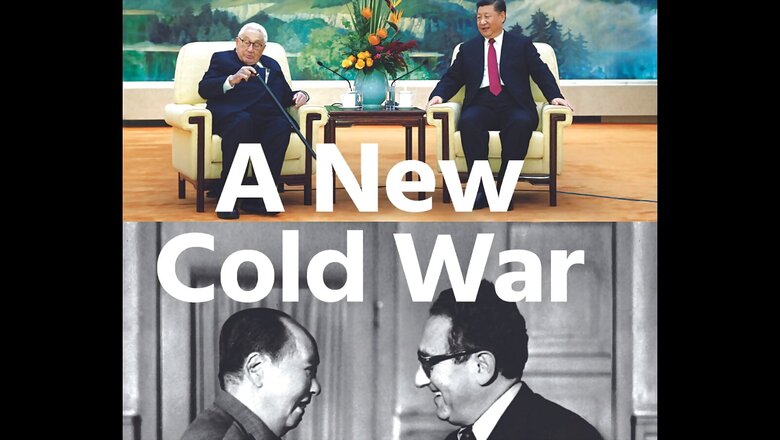
views
In the 565-page treatise On China that begins with what strategic affairs scholar Edward Luttwak dubbed as a ‘fawning dithyramb to the farsighted strategic wisdom of the Han’, Kissinger makes but a passing reference to the normalization of trade relations between the US and the People’s Republic of China and a cursory one to US support for its membership of the WTO. Yet, China’s rise as a major power in the first two decades of the twenty-first century has been contingent upon its emergence as a trading superpower, aided by US investments in China and the US-China trade relations.
The rapid escalation of the US-China economic and business relations in the 1970s and ’80s was rudely interrupted by the events at Tiananmen Square in 1989. The US administration had no option but to link its annual extension of the ‘most favoured nation’ (MFN) trade status to China to the latter’s record on human rights. As Kissinger notes, the ‘core’ of President Clinton’s China policy in the early 1990s was a ‘resolute insistence upon significant progress on human rights in China’. Through the first two years of his first term, President Clinton adhered to this principle, while China resolutely opposed it. Kissinger notes:
These tensions, which seemed to undo two decades of creative China policy, led to a split in the administration between the economic departments and the political departments charged with pressing the human rights issues. Faced with Chinese resistance and American domestic pressures from companies doing business in China, the administration began to find itself in the demeaning position of pleading with Beijing in the final weeks before the MFN deadline to make enough modest concessions to justify extending MFN.
The ‘intertwining’ of the two economies, as Kissinger puts it, through the ’90s, of the US trade with China overtaking its trade with Taiwan, resulted in a sevenfold increase in Chinese exports to the US. ‘American multinationals viewed China as an essential component of their business strategies, both as a locus of production and as an increasingly monetary market in its own right.’ Kissinger viewed increased Chinese exports to the US as contributing to an American leverage on China, increasing China’s ‘dependence’ on the US. What he failed to draw attention to was the equally important leverage China had acquired vis-a-vis the US by becoming a vital component of the business strategy of every Fortune 500 company in the US.
ALSO READ | On Pokhran Tests, Vajpayee-Jaswant Singh Got the Better of China & Its Strategy to Isolate India
Commenting on the complaints of US economists about China undervaluing its currency to push its products into the US market, Kissinger argued, ‘Were China to adopt the American conventional wisdom, it might reduce its incentives for ties with the US because it would be less dependent on exports and foster the development of an Asian bloc because it would imply enhanced economic ties with neighbouring countries.’ In what sounds like a defence of China’s exchange-rate policy—a deliberate undervaluation of the Yuan aimed at export-promotion—Kissinger was mouthing an argument of the left-wing Latin American dependency theory that viewed exports as creating a dependence that was beneficial to the importing country and not the exporting economy.
‘The underlying issue is therefore political not economic,’ concluded Kissinger. ‘A concept of mutual benefit rather than recriminations over alleged misconduct must emerge. This makes it important to evolve the concept of co-evolution and of Pacific Community.’ Kissinger’s idea of ‘co-evolution’ and the suggestion of an entente cordiale within a ‘Pacific Community’, generously dubbing human rights abuses in China as ‘alleged misconduct’, helped communist China consolidate its gains and seek great power status as a ‘civilizational power’.
While Kissinger does not offer any discussion of China’s entry into the WTO in his book On China, apart from noting the fact that like the staging of the 2008 Beijing Olympics, this too was a positive achievement for China, the fact is the US treatment of China as an economic partner rather than a political adversary, readily willing to ignore its ‘alleged misconduct’, defined the bilateral relationship through the period of China’s rise from 1980 to 2010.
Publishing his book on China in 2011, three years after the trans-Atlantic financial crisis and China’s emergence as a trading superpower, Kissinger found no reason to revisit his argument about co-evolution of the two trading giants. Kissinger’s support for China’s entry into the WTO was not just academic. He used his considerable influence to actively lobby on behalf of American corporations with financial and commercial interests in China. Kissinger Associates, Inc. became an influential money-spinner in Washington, DC’s policy world, with many of its associates walking in and out of key government jobs as senior members of successive administrations. In ‘buying’ Chinese friendship during the Cold War, Kissinger had essentially invested in the ‘selling’ of American business to China and Chinese interests to US policymakers. The bilateral business and political relationship has since defined the US-China equation through the post-Cold War era.
This excerpt from A New Cold War: Henry Kissinger and the Rise of China edited by Sanjaya Baru and Rahul Sharma has been published with the permission of HarperCollins Publishers India
Read all the Latest News, Breaking News and Coronavirus News here.




















Comments
0 comment